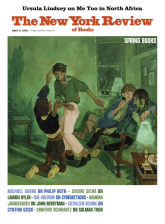In response to:
A Wisewoman in Stratford from the January 14, 2021 issue
To the Editors:
I very much enjoyed Stephen Greenblatt’s authoritative review of Maggie O’Farrell’s novel Hamnet [NYR, January 14]. However, I was surprised that Greenblatt did not point out one egregious factual error about the Bard in the book. In her author’s note, O’Farrell writes, “The Black Death or ‘pestilence,’ as it would have been known in the late sixteenth century, is not mentioned once by Shakespeare in any of his plays or poetry.” Not so fast, Ms. O’Farrell!: there is indeed a mention of the plague near the end of Romeo and Juliet, when Friar John lets Friar Laurence know that the message he was supposed to carry to Romeo in Mantua was not delivered because he and another friar were “visiting the sick,” and “the searchers of the town,/Suspecting that we both were in a house/Where the infectious pestilence did reign,/Sealed up the doors and would not let us forth,/So that my speed to Mantua was stayed” [act 5, scene 2]. So there you have it: “pestilence” and quarantine, something the young poet witnessed in London during the plague visitation(s). Given the fact that this tragedy about the star-crossed lovers is perhaps Shakespeare’s most popular play, one known to most high school students, this is not a misprision that O’Farrell should have committed!
Eugene Stelzig
Professor of English Emeritus
SUNY Geneseo
Geneseo, New York
Stephen Greenblatt replies:
Eugene Stelzig is correct to remember the pestilence in Romeo and Juliet, not to mention Mercutio’s “A plague on both your houses.” The more carefully you look, the more you see constant allusions in Shakespeare to the dread disease. “Thou art a boil,” Lear tells his daughter Goneril, “A plague sore, or embossed carbuncle/In my corrupted blood.” “Here’s gold,” the misanthropic Timon of Athens offers his visitor, “Be as a planetary plague, when Jove/Will o’er some high-viced city hang his poison/In the sick air.” “Boils and plagues/Plaster you over,” Coriolanus sneers at the plebeians; “that you may be abhorred/Farther than seen, and one infect another.” Et cetera.



